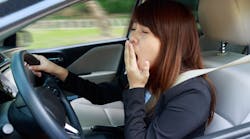Asleep at the Wheel: Drowsy Driving Prevention Week Addresses Healthy Sleeping Habits
Although 6,400 deaths annually can be attributed to drowsy driving, the actual instance of driving while sleep deprived are underreported. The National Sleep Foundation has declared Nov. 6-13 Drowsy Driving Prevention Week in an effort to raise awareness of the risks of driving while drowsy.
“Three days out of the week the average American is not well-rested, which has implications for productivity, well-being, mood, health, and of course, driving,” ,” said NSF Research Fellow Kristen Knutson, PhD in a statement. “This suggests that the occurrence of drowsy driving is likely underreported.”
More than seven million drivers, or three percent of the United States population, have reported falling asleep behind the wheel within the past two weeks. In addition, respondents to a survey conducted by NSF indicate people only felt rested an average of four days per week, according to the foundation.
“These numbers highlight the importance of drowsy driving legislation, public education and awareness programs,” the NSF stated on its website. “This annual campaign, which coincides with the end of daylight saving time, provides public education about the risks of driving while drowsy and ways to improve safety.”
About 15 million Americans work full time on evening shift, night shift, rotating shifts, or other employer arranged irregular schedules, according to the Bureau of Labor Statistics. Both shift work and long work hours have been associated with health and safety risks, according to NIOSH.
While the actual costs of sleep deprivation including related health problems, lost worker productivity and accidents have not been calculated, the National Heart, Lung and Blood Institute is working to educate employers, employees and Americans about the importance of healthy sleeping habits.
The average adult needs seven to eight hours of sleep to be fully rested. However, even cutting back by one hour can cause a person to be less focused and slow his or her response time on the job. If a worker lacks sleep, they are more likely to make bad decisions and take more risks, according to NHLBI.
The NHLBI provides the following basic tips to get a good night’s sleep:
- Stick to a sleep schedule. Go to bed and wake up at the same time every day.
- Avoid caffeine and nicotine.
- Don’t exercise too late in the day.
- Avoid alcoholic drinks before bed.
- Avoid large meals and beverages late at night.
- Don’t take a nap after 3 p.m.
- Relax before bed. For example, take a hot bath.
- Create a good sleeping environment. Get rid of distractions such as noises, bright lights, an uncomfortable bed or a TV or computer in the bedroom.
- See a doctor if you have continued trouble sleeping.
